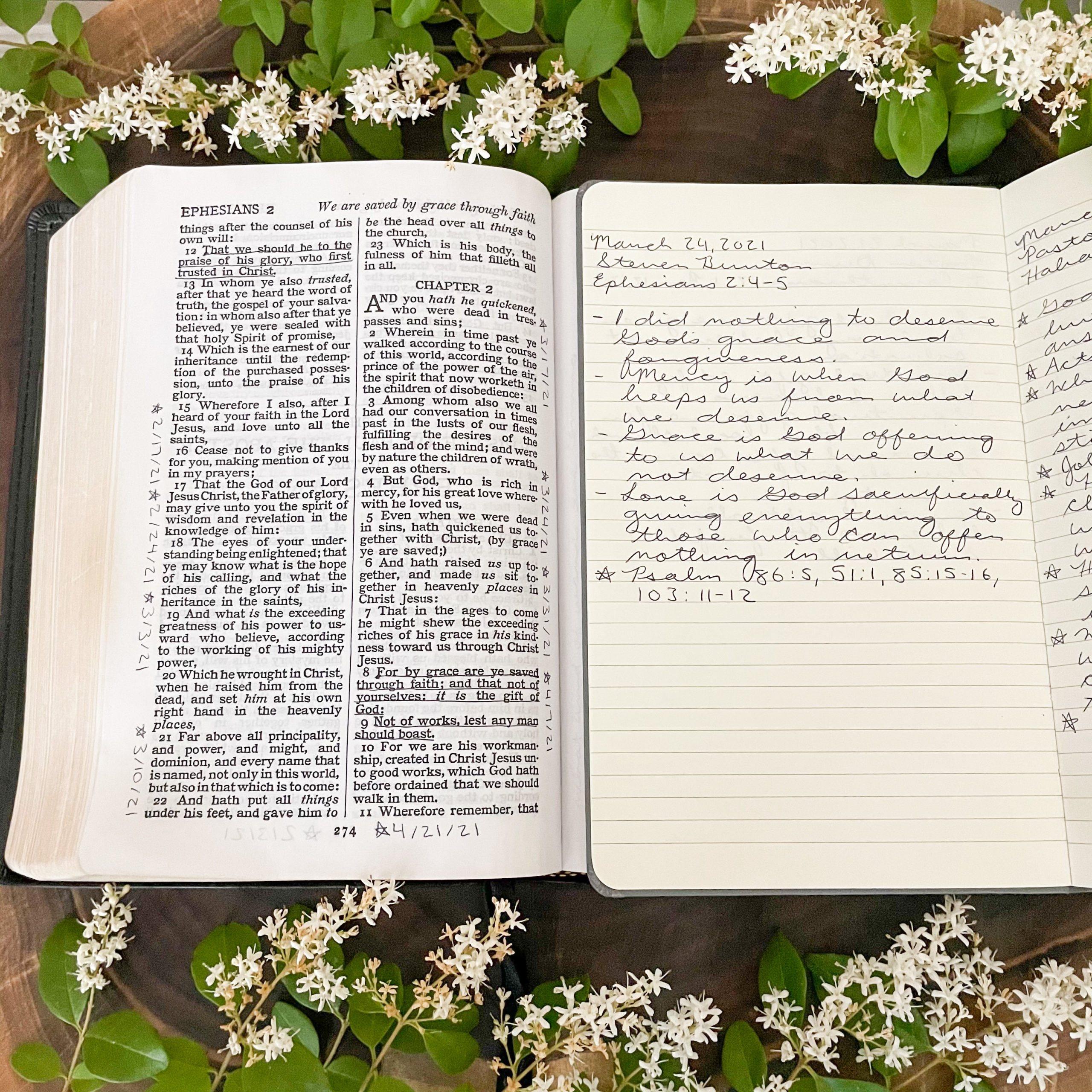
I’ve consistently taken sermon notes for over half of my life, but I’ve always felt a little bit of regret that I didn’t know how I could possibly find a set of notes again if I wanted to reference it. So, my journals have just collected dust on my shelves as time has passed. Occasionally I’ve remembered a specific sermon and tried in vain to find my notes. I may have actually gone back and read my notes once or twice, but certainly no more than that.
I was recently sitting listening to a sermon, and there were so many incredible truths mentioned that I wanted to write all of them in the margin of my Bible so that I wouldn’t forget them! Unfortunately, there wasn’t room in the margin of my Bible, and I was faced with the sad reality that I likely wouldn’t go back and read my sermon notes again. In that moment, I thought of a way that I could easily reference my sermon notes over and over again. Not only would this serve to help me remember the sermons I hear, but it would also enhance my personal Bible study. Over the last couple months, I’ve developed a system to take sermon notes that are actually usable. I hope part (or all!) of this system will be helpful for you, too.
Keep your notes in one place, in chronological order.
Whether you scribble sermon notes on the back of a bulletin or fill in the blanks on a handout, chances are you aren’t keeping that piece of paper very long. I love fill in the blank handouts as much as the next person, but after a while, it’s almost impossible to keep up with them all!
Personally, I find that it’s best to have a notebook specifically for taking sermon notes. I use these Moleskine notebooks. If your church does use some sort of printed outline, go ahead and take one; just transfer any notes you want to keep into your notebook.
If the fill in the blank outline is a must for you, there are a couple ways to keep them organized. You could keep them all in a file box in chronological order, but this may be a little more difficult to sort through when you need to find a specific set of notes. The second option is a bit more labor intensive, but if you have a scanner, you can scan the handouts and save them in a file together on your computer. I had hundreds of sermon notes handouts from college, and I still have them saved on my computer this way.
Whether you write your notes in a notebook, keep them in a file, scan handouts into your computer, or do something entirely different, make sure you keep them in chronological order.
Write the date at the top of your notes and in your Bible next to the key passage.
This is the key to being able to find your notes when you need them. If you’re looking for notes on a specific passage or topic, you’ll be able to find the date in the margin of your Bible. If you have your notes in chronological order, it will be easy to find any notes you have on that specific passage.
I only recently started doing this, but I know it will be so helpful in making my sermon notes actually useful! I’ve kept notes in chronological order for quite some time, so I plan to go back and write the dates for the notes next to the key passages in my Bible.
I realize some people don’t like to write in their Bibles, but I would really encourage you to try this. God wants His Word to make a difference in our everyday lives, and if writing a date in the margins can help you, you should do it! I have a few Bibles (as do many Americans; we are so blessed!), and I use one exclusively for church. There are a few notes in the margins of this Bible, but it’s mostly open for writing dates. If it would help you to get a new Bible just for this purpose, go ahead and do it! It doesn’t have to be anything fancy or expensive, and the margins don’t have to be especially wide. You just need to be able to write a date. Something like this would work just fine.
Take lots of notes, including lots of Scripture references.
If you don’t know where to start with taking notes, you can just write down the main points as the preacher gives them. Sometimes I do this, but sometimes I just write down the statements that especially speak to my heart. No matter how you take notes, I would encourage you to write down as many Scripture references as you can that are mentioned in the sermon. When you go back to study a passage later, you will be able to look up the references related to that passage. And who knows? Maybe you’ll have sermon notes on those passages to take your study even further!
I hope something here will be helpful to you! Do you have any other ways you keep your sermon notes organized and usable? Let me know in the comments!
